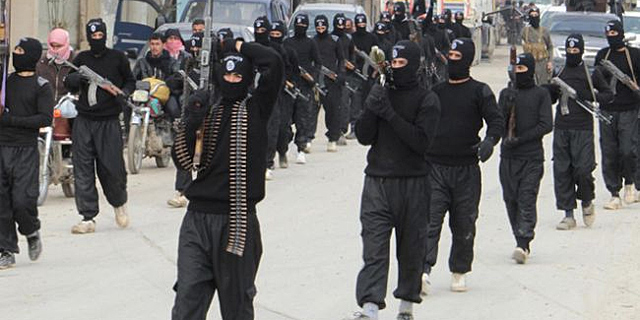PHOTO: Islamic State fighters in northern Syria (File Photo)
The Islamic State has resorted to executions to maintain its authority in areas that it controls in northern Syria. A series of public killings have been carried out, including last week’s filmed shooting of five men for spying, and at least three women have been slain in the last three weeks in Raqqa.
So why would anyone risk death to defy ISIS? Zeid a-Thabit, a citizen journalist and participant in a graffiti campaign against the Islamic State, explains in an interview with Syria Direct:
Q: A number of anti-IS slogans have appeared on the walls of al-Bukamal city in the form of graffiti and pamphlets. Are these the actions of individuals or an organized campaign?
It’s a campaign organized by a team of young men active on the ground, well-trained in both distributing the slogans and in protecting themselves. The campaign is ongoing, but I can’t talk specifics about the timing. We’ll choose the appropriate time and place in order to protect our team inside Syria. There will be awareness campaigns directed at all age groups.
Q: What’s the goal behind spreading these pamphlets? Where are you distributing them?
We undertook these campaigns in Deir ez-Zor and Raqqa. The goal is to provide support to civilians who are afraid of Islamic State ideas spreading. Therefore we launched the poster campaign with the slogans “Dabih” and “Assad and Daesh [the Islamic State] are two sides of the same coin”.
The word “Dabih” is taken from IS’s magazine “Dabiq”, but it means, in the Syrian dialect, “stuck to”. The point is for humor to overcome the language of war that has become a part of people’s souls, which they drink in every day like water.
There were also pamphlets that connected IS to Assad, and reminded residents of the revolution with the slogan “Free Syria welcomes you,” in order to rejuvenate their souls with a sense of hope after the Islamic State had filled them with blackness.
The “Dabih” awareness-raising pamphlets are directed at all ages and intend to combat IS’s mode of thought via peaceful means, or to put a stop to its influence among residents.
The pamphlets were distributed in all the provinces in a quick campaign, out of fear of IS’s repression. Anyone caught doing it would be executed immediately.
Q: You’re running the risk of getting killed by distributing these pamphlets. How do you feel as you’re carrying out your work?
It’s true that we’re threatened with death at any moment. But there’s no room for resistance aside from spreading news and pamphlets.
Although the work is dangerous, it makes us feel powerful, and gives us hope. I no longer fear death or decapitation; what pains me more is seeing the looks in the eyes of residents and on children’s faces, staring, as the executions are carried out. I feel like they’re cutting off my head a thousand times [when I see] the eyes of those children. These scenes of execution become cemented in their minds, and become, over time, something normal, something legitimate.
Realistically speaking, these measures that we’re undertaking might not mean a thing to a lot of people, considering how basic they are. But it’s the only thing we can do in order to make us feel that we have power, that we’re human beings and still alive.
Believe me, when I smoke a cigarette at home I feel like I’ve defeated [Islamic State spokesman] al-Adnani, trampled on [ISIS leader] al-Baghdadi. The important part is that the cigarette is something that goes against the Islamic State.
Q: What was IS’s reaction after they saw the pamphlets?
IS became hysterical after seeing the pamphlets. They set up checkpoints in the streets in order to confiscate and destroy them, and asked residents if they had seen anyone who put them up on the walls, or any civilian who took one with them. They began a campaign storming houses and arresting residents.

